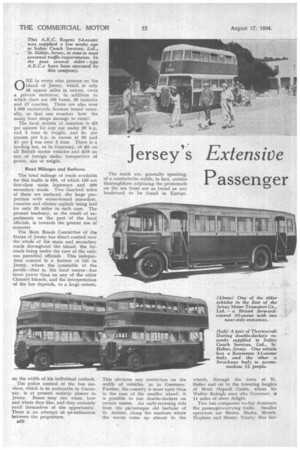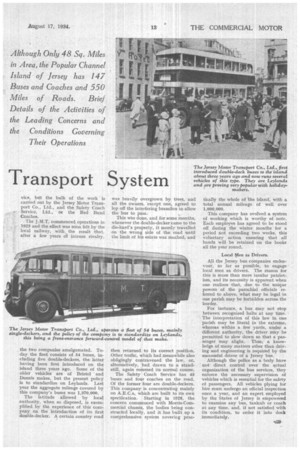Jerse y' s
Page 42

Page 43

If you've noticed an error in this article please click here to report it so we can fix it.
Extensive
Passenger Transport System
0 NE in every nine persons on the island of Jersey, which is only 48 square miles in extent, owns a private motorcar, in addition to which there are 100 buses, 95 taxicabs and 47 coaches. There are also over 1,000 motorcycle licences issued annually, so that one wonders how the many boot shops manage to exist!
The local system of taxation is E3 per, annum for any car under 20 h.p. and 2 tons in weight, and Ss. per annum per h.p. in excess of 20 and £.1 per ton over 2 tons. There is a landing tax, as in Guernsey, • of £5 on all British motor vehicles and £10 on any of foreign make, irrespective of power, size or weight.
Road Mileages and Surfaces.
The total mileage of roads available for this traffic is 550, of which 150 are first-class main highways and 400 secondary roads. Two hundred miles of these are surfaced, the large proportion with water-bound macadam, concrete and clinker asphalt being laid for only 20 miles in each case. The present tendency, as the result of experiments on the part of the local officials, is towards the greater use of concrete The Main Roads Committee of the States of Jersey has direct control over the whole of the main and secondary roads throughout the island, the byroads being under the care of the various parochial officials. This independent control Is a feature of life in Jersey, where the constable of the parish—that is, the local mayor—has more power than on any of the other Channel Islands, and the interpretation of the law depends, to a large extent, on the width of his individual outlook.
The police control of the bus services, which is so noticeable in Guernsay, is at present entirely absent in Jersey. Buses may run when, how and where they like, and they certainly avail themselves of the opportunity.. There is no attempt at co-ordination between the proprietors.
B28 The roads are, generally speaking, of a comfortable width; in fact, certain thoroughfares adjoining the promenade on the sea front are as broad as any boulevard to be found in Europe.
This obviates any restriction on the width of vehicles, as in Guernsey. Further, the country is more open than in the case of the smaller island; it is possible to run double-deckers on certain routes. An early-morning ride from the picturesque old harbour of St. Aubins, along the seashore where the waves come up almost to the wheels, through the town of St. Helier and on to the towering heights of Mont Orgueil Castle, where Sir Walter Raleigh once Wks Governor, is 11 miles of sheer delight.
Two bus companies to-;day dominate the passenger-carrying traffic. Smaller operators are Messrs. Slades, Messrs. Hopkins and Messrs. Trinity Bus Ser
vice, but the bulk of the work is carried out by the Jersey Motor Transport Co., Ltd., and the Safety Coach Service, Ltd., or the Red Band Coaches.
The J.M.T. commenced operations in 1923 and the effect was soon felt by the local railway, with the result that, after a few years Of intense rivalry,
the two companies amalgamated. Today the fleet consists of 54 buses, including five double-deckers, the latter having been first introduced on the island three years ago. Some of the older vehicles are of Bristol and Dennis makes, but the present policy is to standardize on Leylands. Last year the aggregate mileage covered by this company's buses was 1,370,000.
The latitude allowed by local authority, when so disposed, is exemplified by the experience of this cornpa,ny on the introduction of its first double-decker. A certain country road
was heavily overgrown by trees, and all the owners, except one, agreed to lop off the interfering branches to allow the bus to pass.
This was done, and for some months, whenever the double-decker came to the die-hard's property, it merely travelled on the wrong side of the road until the limit of his estate was reached, and then returned to its correct position. Other traffic, which had meanwhile also obligingly contravened the law, or, alternatively, had drawn to a standstill, again resumed its normal course.
The Safety Coach Service has 45 buses and four coaches on the road. Of the former four are double-deckers. This company is concentrating mainly on A.E.C.s, which are built to its own specification. Starting in 1928, the concern commenced with Morris-Commercial chassis, the bodies being constructed locally, and it has built up a comprehensive system covering prac
tically the whole of the island, with a total annual mileage of well over 1,000,000.
This company has evolved a system of working which is worthy of note. Each employee has agreed to be stood off during the winter months for a period not exceeding two weeks, this voluntary action ensuring that all hands will be retained on the books aU the year round.
Local Men as Drivers.
All the Jersey bus companies endeavour, so far as possible, to engage local men as drivers. The reason for this is more than mere insular patriotism, and its necessity is apparent when one realizes that, due to the unique powers of the parochial officials referred to above, what may be legal in one parish may be forbidden across the border.
For instance, a bus may not stop between recognized halts at any time. The interpretation of this law in one parish may be literal in the extreme, whereas within a few yards, under a different authority, the driver may be permitted to slow down so that a passenger may alight. Thus, a knowledge of many matters other than driving and engineering is required by the successful driver of a Jersey bus.
Although the police as a body have not direct control over the actual organization of the bus services, they enforce the necessary supervision of vehicles which is essential for the safety of passengers. All vehicles plying for hire must undergo an official inspection once a year, and an expert employed by the States of Jersey is empowered to examine any bus, taxicab or coach at any time, and, if not satisfied with its condition, to order it into dock immediately.




























































































